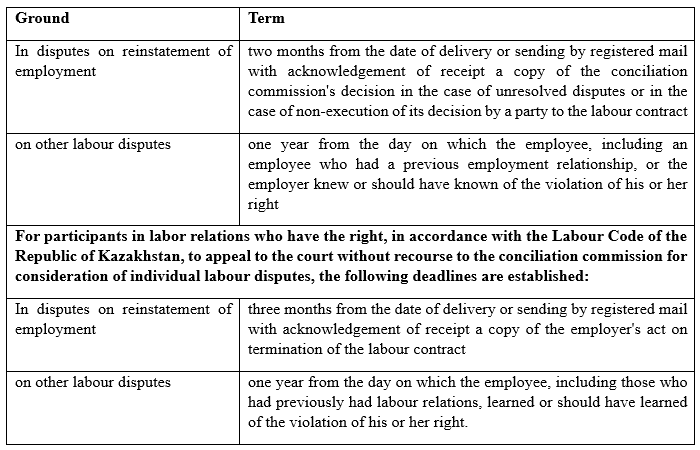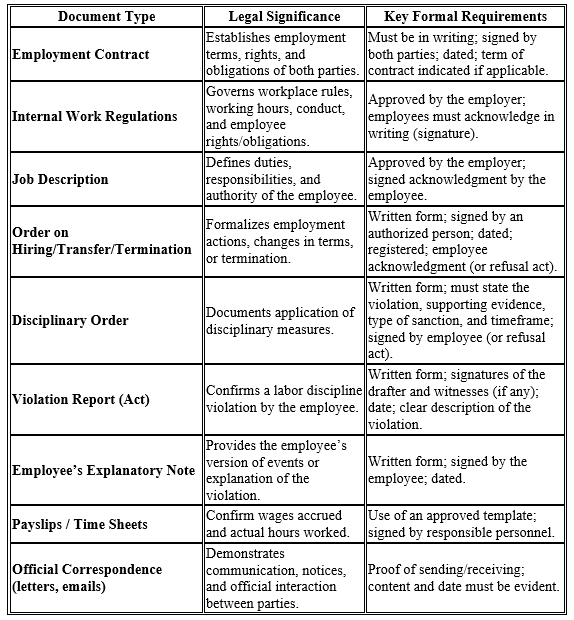Peculiarities of consideration of individual labour disputes in the court of Kazakhstan
Pre-trial stage of labour dispute resolution in Kazakhstan
The resolution of individual labour disputes in Kazakhstan must undergo a mandatory pre-trial procedure through conciliation commissions, as established by Article 159 of the Labour Code of the Republic of Kazakhstan. (TR KZ) except for disputes arising between an employer and an employee of a micro-entrepreneurial entity, a non-profit organisation with no more than fifteen employees, a domestic employee, the sole executive body of a legal entity, the head of the executive body of a legal entity, as well as other members of the collegial executive body of a legal entity. Under Article 159 of the Labour Code, the application of employees or persons who have previously had an employment relationship or of the employer to a conciliation commission is an obligatory stage of the pre-trial procedure for the settlement of an individual labour dispute between them. Conciliation commissions consider individual labour disputes on issues arising in the application of labour legislation in the regulation of labour relations, relations directly related to labour relations, social partnership, and occupational safety and health.
The conciliation commission is obliged to consider the dispute within fifteen working days from the date of registration of the application and to issue copies of the decision to the parties to the dispute within three working days from the date of its adoption. The decision of the conciliation commission shall further allow the party disagreeing with the decision to exercise its right to file a lawsuit in court.
Terms of applying to the court

Proceedings
Judicial consideration of a labor dispute follows the general rules of the Civil Procedure Code of the Republic of Kazakhstan (CPC) and includes the filing of a statement of claim.
By virtue of the requirements of paragraph 6 of the first part of Article 148 of the Code of Civil Procedure, the statement of claim must contain information on compliance with the pre-trial procedure of appeal to the defendant (conciliation commission), except for disputes between persons specified in paragraph 1 of Article 159 of the Labour Code of the Republic of Kazakhstan.
The claim must, in an obligatory order, contain a reference to the rule of law, on which the claims are based, including information established by the CPC RK.
Within five working days from the date of receipt of the claim, the judge shall decide whether to accept it into the proceedings of the court. Having accepted the claim into the proceedings of the court of first instance, the judge shall issue a ruling on the initiation of civil proceedings, indicating the language of the proceedings.
The defendant has the right, before the end of the preparation of the case for trial, to bring a counterclaim against the claimant for joint consideration with the original claim.
Preparation of the case for trial
Once the application has been accepted by the court and the civil case has been instituted, the judge shall prepare the case for trial in order to ensure its timely and correct resolution.
The tasks of preparing a civil case for trial, mandatory for each case, are:
1) clarification of the circumstances relevant for the correct resolution of the case;
2) determination of the legal relations of the parties and the law to be followed by the court;
3) resolution of the issue of the composition of the persons participating in the case and their proper notification of the time and place of the court session;
4) determining the evidence that each party must submit in support of its claims or objections;
5) facilitating reconciliation of the parties.
During the preliminary court hearing, the court shall discuss with the parties the circumstances of the case, ask questions, determine the nature of the disputed legal relationship and circumstances conducive to reconciliation of the parties. The parties present and other persons involved in the case shall be heard.
The judge, having determined that the case is ready for trial, shall notify the parties and other persons involved in the case of the time and place of the trial.
The trial shall commence no later than twenty working days after the date of completion of its preparation.
Evidence in Legal Proceedings
Particularities of the Burden of Proof in Employment Disputes
Each party must prove the circumstances to which it refers as the basis for its claims or defenses. Parties are required to exercise their rights of defense, assert or contest facts, present evidence and objections thereto within the time limits set by the judge. These timeframes must reflect good faith and be aimed at facilitating the judicial process.
Evidence may be submitted during the trial phase if the party substantiates that it was impossible to submit it during the pre-trial preparation stage.
In employment disputes, the burden of proof is shifted to the employer. According to Normative Resolution No. 1 of the Supreme Court of the Republic of Kazakhstan dated November 28, 2024, “On Certain Issues of the Application of Legislation by Courts in the Resolution of Employment Disputes,” the employer bears the obligation to prove the legality of its actions in cases of termination of employment, imposition of disciplinary sanctions, etc. This requires employers to proactively and meticulously document all HR actions, including adherence to procedures, issuance of notices, and provision of justification. Failure to do so may result in the employer losing the case.
Importance and Proper Execution of Documentary Evidence
Documentary evidence often plays a key role due to its objective nature and its ability to confirm factual circumstances. Internal documents (employment contracts, orders, internal regulations, acts, payslips) serve to confirm the employment relationship and related actions. External correspondence (letters, emails) can also be decisive.
Documents must comply strictly with legislative requirements: they must be in writing, signed by authorized persons, and acknowledged by the employee’s signature. Proper registration, archiving, completeness, and accuracy are essential.
Improperly executed documents may lose their evidentiary value, prevent the employer from substantiating its position (especially given the shifted burden of proof), and result in legal liability.
Common Types of Documentary Evidence and Their Legal Significance in Employment Disputes

Resolution of Employment Disputes in Kazakhstan
Employment disputes inKazakhstan require mandatory pre-trial procedures and involve a shifted burdenof proof in favor of the employee. Proper documentation is critical.Compensation for moral damages may be awarded if the employer is found to be atfault.
Success in employmentdisputes in Kazakhstan hinges on a deep understanding of the legal framework,particularly the burden of proof, combined with meticulous preparation andrigorous evidence management.